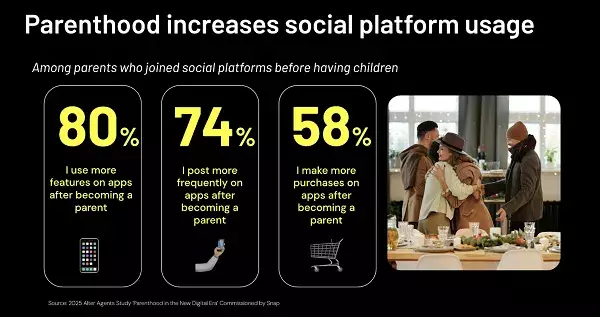The landscape of parenting has undergone a profound transformation, largely driven by the pervasive influence of social media. Contrary to the naive assumption that parenthood might diminish our digital engagement, recent insights reveal an intriguing paradox: becoming a parent often amplifies social media activity. This shift suggests that social platforms are not just about sharing snapshots of life, but have evolved into essential tools for navigating the complexities of modern parenting. They serve as digital anchors—connecting parents, children, and brands—forming an intricate web that supports, guides, and influences family life.
While many might expect new realities—such as reduced social outings—to result in less online activity, the data paints a more nuanced picture. Parenting creates a paradoxical environment where more time at home and unique daily challenges generate both a desire and necessity to stay connected. Parents often use social media to document their journey, join communities for advice and support, and explore product options—turning these platforms into virtual parental forums and marketplaces simultaneously. Understanding this dual role is essential for marketers and social platforms alike, as they navigate a generation for whom social media is both a lifeline and a hub of parenthood.
The Evolution of Parental Engagement Online
The current era witnesses parents turning to social media more frequently after welcoming children. Studies from major platforms like Snapchat, in partnership with Havas Media Network, indicate that over half of parents globally increase their usage post-childbirth. These elevated engagement levels span posting behavior, in-app feature utilization, and even purchasing activities directly within social platforms. It’s clear that social media becomes a vital part of everyday parenting, acting as a digital co-parent that provides both emotional support and practical resources.
The influence of social media extends beyond mere sharing; it shapes shopping habits and decision-making processes. Parents often find themselves exploring products online with their children, combining their child’s preferences with their own research. In fact, more than 86% of parents report shopping online with their kids, with a significant proportion influenced by social media content their children see and share. This collaborative shopping reflects a broader cultural shift toward co-discovery—a shared experience that melds parental guidance with children’s digital social worlds.
What’s particularly fascinating is the timing of increased social media activity. Moments like holidays, birthdays, and, notably, Black Friday, trigger peaks in online engagement. For parents, these occasions are opportunities for discovery, inspiration, and making well-informed purchasing decisions. These periods underscore the importance of strategic marketing efforts that align with the natural rhythms of family life, creating targeted touchpoints during high-engagement moments.
Reimagining Marketing Strategies for a Parent-Centric Digital Space
In an era where social media plays a pivotal role in parenting, marketing strategies must evolve to resonate with this unique demographic. The insights highlight that parents are highly receptive to content during specific times—particularly after school hours, weekends, and holiday seasons. Ads and campaigns designed to target these windows can capture the attention of busy, digitally connected parents seeking guidance or inspiration.
Furthermore, the collaborative nature of modern parenting means that marketing messages should be crafted to appeal not only to parents but also to children—their young co-conspirators in the digital shopping journey. Brands that understand how children influence family purchases and how social media fuels this co-discovery are better positioned to build trust and loyalty. Personalization, authenticity, and timing are critical elements for brands aiming to embed themselves into the family’s digital routines.
The rise of social commerce, highlighted by parents frequently purchasing directly from social platforms, signals an important shift. It suggests that integrated shopping experiences—coupled with authentic storytelling and relatable content—are likely to turn casual observers into loyal customers. As we approach the end-of-year shopping frenzy, those who understand the rhythm of parental online behavior will have a significant edge, ensuring their messaging is both timely and impactful.
The modern parent is more digitally engaged than ever before, not merely as a consumer but as an active participant in their family’s digital ecosystem. This shift offers vital opportunities and challenges—urging brands to rethink their approach and embrace the nuanced realities of parenting in the digital age.

